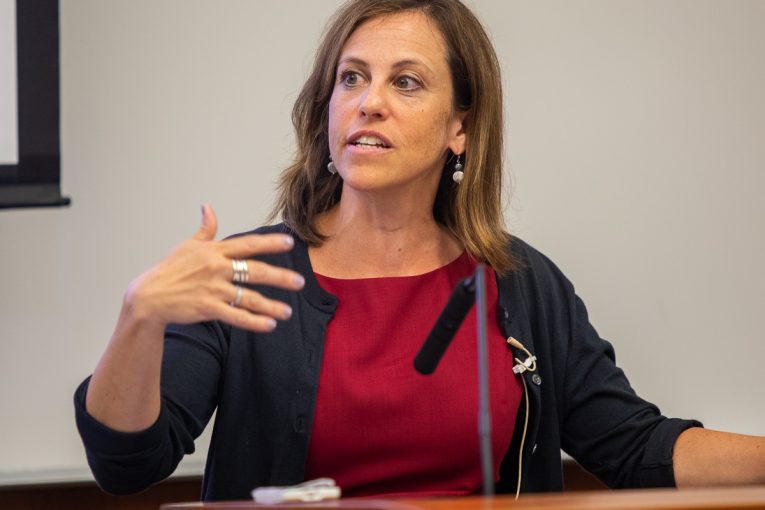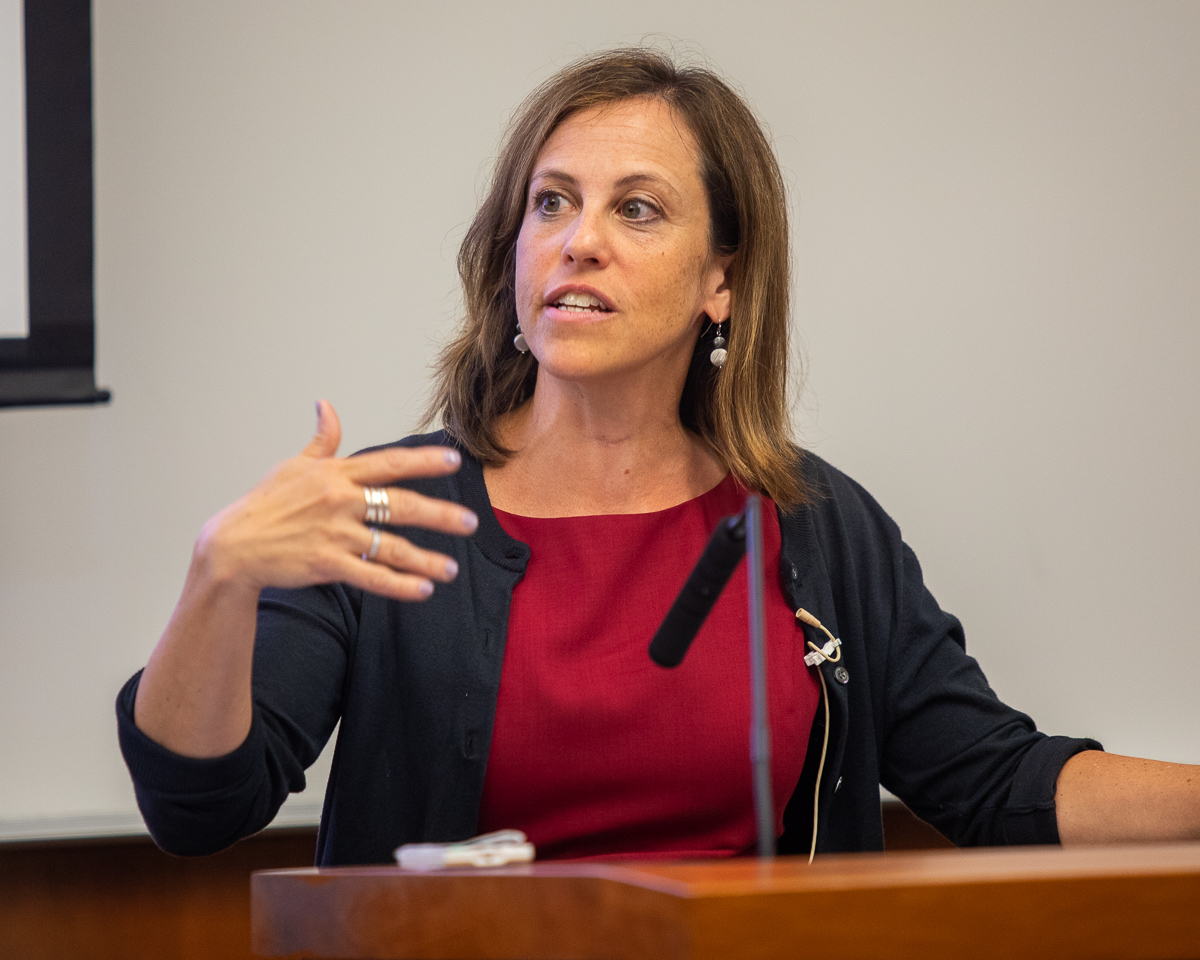

By Julia Asby and Ramneet Singh
WASHINGTON – A forum Friday focused on recent events at the U.S. Capitol, impeachment and the new Biden Administration, and was hosted by law school Dean Trevor Morrison and included New York University Law experts in constitutional law, criminal law, and national security.
The discussion began with Morrison providing a brief overview of the events that took place at the Capitol on Jan. 6. Morrison and the other participants would go on to discuss the events at the Capitol as well as their legal and historical ramifications.
Morrison touched on the second impeachment of President Donald Trump, stating “it seems likely” that the formal delivery articles of impeachment or a trial may not occur until after the upcoming inauguration.
This prompted the question: “Can you try a former president on articles of impeachment after his term is over?” After some related questions, Morrison deferred to Vice Dean Rachel Barkow to answer that question.
Barkow said that this was a decisive issue and that there was not as much in-depth analysis for such a constitutional question as one might expect, suggesting it was possible, citing historical practice where a “former officer” stood trial. Importantly, Barkow noted the decision partly focused on the potential aversion of accountability and “avoid the disqualification from holding of future office.”
Concerning the time, Barkow understood that the trial would occur after the inauguration. She referred to the potential concern that certain Biden appointees be confirmed so that the trial  does not consume all of the Congressional time or that the trial does not immediately take place.
does not consume all of the Congressional time or that the trial does not immediately take place.
She did not believe that the trial was not overly complicated but depended on the level of details, and proposed that a more detailed timeline of events would be useful to convince Republican Congressmen.
The forum included a discussion on impeachment and the problems that come along with removing President Trump from office at this time.
Preet Bharara, a law professor, described how an impeachment and trial would be difficult to conduct simultaneously with other Congressional matters.
He stated that during an impeachment trial, all senators must be present. Therefore, concurrent hearings would be difficult. The legislature is tasked with confirming cabinet members and passing important COVID-19 legislation.
Melissa Murray, a law professor, provided insight on the responsibility of elected officials and expectations placed on those officials to “…to perform some of the most important tasks that they’ve been elected to do, while also perhaps, holding the President accountable.”
At multiple points, the legal experts referred to the first case of impeachment against President Trump and the trial. Comparatively, Morrison pointed out that “incitement to insurrection” could be viewed as being a greater impeachable offense.
Concerning a potential defense, Bharara stated a procedural argument that a former President may not be tried on articles of impeachment. As a secondary argument, he stated that “to be able to be impeached for incitement to insurrection, you have to meet the elements of the insurrection statute, a violation of statute and impeachment have to be coextensive.”
From this, he said, one could argue the statutory violation or impeachment, the standard was not met because the President did not openly call for insurrection. Bharara articulated this defense through statements by the President’s legal team and did not necessarily agree with these arguments
As a response, Morrison brought up the question of whether an impeachable offense has to also violate legal code. He presented a counter-argument, which relates to the first amendment and its applicability to an officeholder.
Ryan Goodman, a professor of law, acknowledged that the Office of Legal Counsel held the position that a sitting president cannot be indicted and prosecuted. Still, he affirmed that this was temporary immunity.
Following this, Goodman stated that there would be a focus on the action of U.S. attorneys and that there should be a focus on the “authorities of D.C.” Goodman noted the potential action of the New York state authorities and how it would relate to the topic at hand.
Andrew Weismann, a law professor, suggested that a model of prosecution “…where you pick some U.S. attorney…imbued with a lot of the independence of a special counsel.” He noted that they would need to be “beyond reproach.”
Concerning prosecution, Bharara questioned if federal officials would pursue criminal charges given that President Trump was not convicted. Barkow stated that this would depend on the nature of the trial.
Morrison specified that Bharara was asking from “the discretion of a prosecutor,” but approached the question from an institutional perspective. Beyond the political aspects of the question, Murray replied that “there are…questions of criminal liability” tend are pursue through the courts.
Morrison shifted to the questions related to a self-pardon and a blanket pardon for others involved.
Firstly, Barkow expounded on the importance of clemency because “we don’t have parole, we don’t have a mechanism for expungement,” and that it is beneficial to the general populace.
For a self-pardon, Barkow stated that “we don’t have a definite constitutional answer” and she illustrated there are constitutional arguments to be made on both sides of the issue.
Barkow affirmed that Trump could pardon others, “the only limits will be how he writes it.”
Barkow also mentioned that it is unclear who would have the proper standing to raise this question. President Trump is the first President in history to be impeached twice and the current events are raising new constitutional questions.
Weismann brought up the potential of a quid pro quo, the implications of those involved, and the validity of the pardon. Barkow responded it wouldn’t impact the validity, but “…it could be grounds for a separate prosecution of that person.”
Barkow touched on the historical use of pardons and their differences but held that the person being pardoned would have to accept it and President Trump would need to be “a legitimate office holder” to grant a pardon. She also touched on the legal expertise needed to construct the pardon
Morrison moved on to focus on the relationship between lawyers and leadership–a broader ethical question.
Murray honed in on the leadership question, specifically the criticism of Congressman and other leaders concerning the Capitol incident. Relatedly, she connected this to criticism of law schools and stated, “what are we doing to impress upon our students now the importance of being a leader” and the ethical questions legal officials are faced with.
Also, she connected the leadership question to the “raced and gendered” rhetoric and how this might relate to “real anxiety about the changing model of leadership.” She said law schools have an “obligation…to normalize an understanding of diverse leadership that is more inclusive and perhaps prepares the country for what its future will look like.”
Bharata affirmed that lawyers have “…ethical obligations that are different from ordinary people.” He stated that a lawyer should not “…zealously do whatever your client tells you, even if that client is the President of the United States.”
Morrison noted the statement of military officials that centered around a peaceful transition of power. Goodman noted the positive “…reaffirmation of the Constitution…” He found it “unnerving” that “they needed to do it” due to certain unethical perspectives within the military.
As the closing topic, Morrison brought up the contrast between the law enforcement reaction to the events at the Capitol and their reaction to the Black Lives Matter protests that took place over the summer.
Murray discussed a report from ProPublica that revealed the “…grievances that African American officers within the Capitol police had been filing about their treatment…” for potentially over a decade.
The officers made a point that “…the failure to appropriately address these claims of discrimination within the department, actually had real repercussions for how they were able to respond in the moment, and what the response looked like at least from some of their colleagues…”
Barkow told the group that while she was watching the events of Jan. 6 unfold she told her son that he was “watching white privilege in the starkest way I’ve ever seen.”
Barkow commented on how the police were not expecting violence from the Capitol protests, but they automatically assumed that the BLM protests and people of color would be violent.
 Ramneet Singh is a third-year student at the University of California, Davis. He is a Political Science major and is pursuing a History minor. He is from Livingston California.
Ramneet Singh is a third-year student at the University of California, Davis. He is a Political Science major and is pursuing a History minor. He is from Livingston California.
Julia Asby is a third year student at UC Davis majoring in political science with a minor in sociocultural anthropology. She is originally from Sacramento.
To sign up for our new newsletter – Everyday Injustice – https://tinyurl.com/yyultcf9
Support our work – to become a sustaining at $5 – $10- $25 per month hit the link:





This is a very informative and well written article. The first part especially is great information. The second part gets a bit off into identity politics, but in the context of what was said so that still makes the article well-written.
I wanted to ask clarification on two things:
I’m sure this means something if you’re in law school – but what “criticism of law schools” is being referred to here? I have like zero idea.
I don’t know if this is purposefully dog whistle or just not explained, but what is she inferring here? Translation please!
Good questions. My understanding of these statements is that they relate to the current emphasis on developing leadership skills in new lawyers. This includes teaching ethical judgment and decision making skills, which means, for example, not always simply doing what one’s client asks. Diversity in the legal profession is another issue, which starts with an emphasis on diversity in law schools.
Here’s an article on the leadership issue. http://www.sigurdsonpost.com/2016/09/05/lawyers-and-leadership-effective-and-ethical-judgement-and-decision-making-required-to-address-societal-and-professional-challenges/